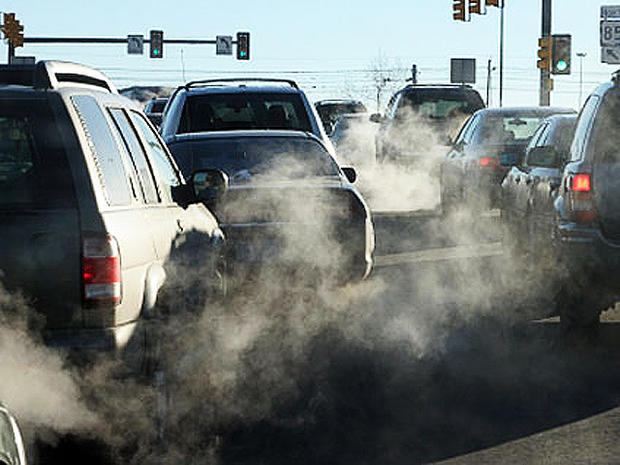Car pollution fast-tracks heart attacks, study says
(CBS) What triggers a heart attack? Studies have linked unhealthy eating, a sedentary lifestyle, and smoking to heart attack risk.
Now they've confirmed something else - air pollution
Pictures: Toxic 20: States with deadliest air
A new study found high levels of car exhaust significantly up the risk a person may suffer heart attack within six hours.
"This large-scale study shows conclusively that your risk of having a heart attack goes up temporarily, for around six hours, after breathing in higher levels of vehicle exhaust," Dr. Jeremy Pearson, associate medical director of the British Heart Foundation, said in a written statement. The foundation co-funded the study, published in the September 21 issue of the British Medical Journal.
For the study, scientists looked at 79,000 heart attack cases that occurred in the U.K. from 2003 to 2006, and compared that to hourly pollution levels from the U.K. National Air Quality Archive. The scientists were looking for two pollutants in particular - nitrogen dioxide and PM10 - that are related traffic-related pollution. Their analysis showed higher rates of those pollutants appeared to increase risk for a heart attack within one to six hours.
The authors note that that pollution may not cause a heart attack, but might help hurry one along. They suspect the pollution "thickens" the blood, making it more likely to clot.
"If anything, it looks like it brings heart attack forward by a few hours," study author Dr. Krishnan Bhaskaran, professor of epidemiology from the London School of Hygiene and Tropical Medicine, told BBC News. "These are cardiac events that probably would have happened anyway."
Heart attack risk subsided after six hours though, leading the authors to conclude that reducing pollution alone might have "limited potential" for cutting heart attack risk. But they added, "That should not undermine calls for action on air pollution, which has well established associations with broader health outcomes including overall, respiratory and cardiovascular mortality."
Other experts called the findings "unsurprising."
"There's lots of data that shows that air pollution is a tremendous cardiac risk," Dr. Bertram Pitt, a professor of medicine at the University of Michigan, told HealthDay. "So if you are part of a vulnerable population and you go out into traffic or something like that and it takes you beyond your threshold you might very well have a heart attack."
So what should people at risk for heart disease do?
"Our advice to patients remains the same," Pearson said. "If you've been diagnosed with heart disease, try to avoid spending long periods outside in areas where there are likely to be high traffic pollution levels, such as on or near busy roads."
Air pollution has also been linked to skin rashes, headaches, dizziness, asthma, and cancer.
The Environmental Protection Agency has more on health risks of air pollution

